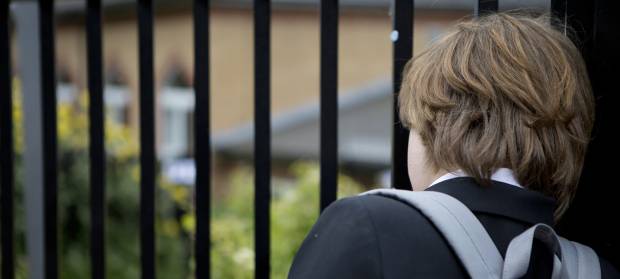If you are being bullied, it is not your fault. No-one deserves to be bullied.
Children and young people with a
learning disability
 A learning disability is to do with the way someone's brain works. It makes it harder for someone to learn, understand or do things.
often experience bullying at school, singled out for being seen as different. This could be things like:
A learning disability is to do with the way someone's brain works. It makes it harder for someone to learn, understand or do things.
often experience bullying at school, singled out for being seen as different. This could be things like:
- speaking or moving differently
- showing emotion differently
- having specialist equipment
- having support from a teaching assistant or SEN Co-ordinator
- making loud noises in class or being easily provoked
- showing loud, excitable or even aggressive behaviour or being easily provoked
- being quiet, seen as an ‘easy target’ or easy to control.
Often kids are singled out for no real reason other than to make another person feel more powerful or popular. See causes of bullying.
Bullying at school includes
- name calling
- making fun of someone
- hitting, slapping, punching, kicking - any physical violence
- ignoring someone and excluding them from social events
- mean jokes
- embarrassing someone
- spreading rumours
- stealing
- getting someone in trouble on purpose
- hurtful messages online (see bullying online).
Steps you can take to stop the bullying
- Talk to someone you trust - your parent, teacher, friend or another family member. If you don’t want to talk to someone you know, call our helpline to talk to a friendly advisor. You can call them for free on 0808 808 1111.
- If you feel that you can talk to the person bullying you and ask them to stop, that is the first place to start.
- If you feel uncomfortable or unable to do this, speak to your teacher, parent or someone else you trust.
- If your school has a bully box, report the incident there.
- Talk to a teacher and tell them what has happened and how it is making you feel. Try to tell them calmly and remember as many details as possible. If you are nervous about telling them in person, you can write it down or tell them in an email.
- If your teacher does not take you seriously or the bullying gets worse, you can tell your parents, the school nurse or your headteacher. It can be upsetting when a teacher doesn’t take you seriously, but remember that it is not your fault and stay calm. Your school will have an anti-bullying policy. You can talk to your teacher about what this means, and can take a parent or friend with you if this makes you feel more comfortable.
- Keep a diary - write down dates, times, any witnesses, who is involved and other details that can help you record what is happening and convince the school to act on it.
- If the bullying continues or you think is harassment, you can report the abuse to the police.
- Find out what support your local council offers: many communities provide local resources to help tackle bullying. The more we become aware of bullying at school, the more likely they’ll take steps to tackle it.
If your school doesn't take it seriously
If the bullying carries on after you have reported it to the headteacher, here are some further steps you can take to make sure the situation is taken seriously:
- If you go to a state school: Write to the chair of governors for the school. The headteacher will tell you their name. Your parents and/or friends can help you too. If it continues after reporting it to the chair of governors, you can
complain
 Complain is when you say you are not happy about something.
to the Local Education Authority.
Complain is when you say you are not happy about something.
to the Local Education Authority. - If you go to an academy: The school or academy will organise a meeting run by three people who were not involved in dealing with the original complaints. If it continues after this meeting, contact the Department for
Education
 Education is when you learn things. When you fill in a form to get a job, education means you write where you went to school, college or university.
.
Education is when you learn things. When you fill in a form to get a job, education means you write where you went to school, college or university.
. - If you go to a private school: You should speak to the chair of the school and put your complaint in writing. If this does not change anything, you should contact the Department for Education.
You can also make a complaint about the school via the gov.uk website.
If you have concerns for someone's wellbeing or safety call Mencap's helpline on 0808 808 1111.

Teachers: talk about bullying
“Teachers - talk openly about disability and stop kids being bullied like I was”
Anti-bullying activities at school
There are several things you can do to make bullying in your school less likely:
- Ask the school to make sure that it is easy for children with a learning disability to understand and report bullying to a teacher.
- Ask your teacher to invite a professional into the school to give a school assembly about bullying, or perhaps the headteacher will talk about it.
- Set up a bully box - this is like a letterbox in which anyone can report a bullying incident. Perhaps you could all make one as a class activity.
- Print out some anti-bullying posters and stick them up around the school.
- Ask a teacher to help you start up a buddy scheme. Students can sign up and
volunteer
 A volunteer is someone who helps out by doing work for free.
to be buddies for people who are worried about being alone at lunch, between classes or after school.
A volunteer is someone who helps out by doing work for free.
to be buddies for people who are worried about being alone at lunch, between classes or after school. - Ask your school what measures they have in place to tackle and prevent bullying.
- Share with your school the government's PDF guide on tackling and preventing bullying.
Schools and the law
Your school will have a behaviour policy to prevent all types of bullying. All schools must have this policy by
law
 Laws are the rules that everyone in the country has to follow. If you don't follow the rules you can get in trouble with the police.
, all teachers, pupils and parents should be told about it.
Laws are the rules that everyone in the country has to follow. If you don't follow the rules you can get in trouble with the police.
, all teachers, pupils and parents should be told about it.
Every school must also follow anti-
discrimination
 Discrimination is when someone is treated differently (usually in a bad way) because of things like their disability or their
religion
Discrimination is when someone is treated differently (usually in a bad way) because of things like their disability or their
religion
 Religion is to do with the things you believe about the world. For example you may believe there is a god or something else. Examples of religions are Christianity, Hinduism, Islam and Judaism.
.
law. This means that teachers have to take steps to prevent discrimination, harassment and victimisation within the school.
Religion is to do with the things you believe about the world. For example you may believe there is a god or something else. Examples of religions are Christianity, Hinduism, Islam and Judaism.
.
law. This means that teachers have to take steps to prevent discrimination, harassment and victimisation within the school.
Some types of bullying are illegal and should be reported to the police, such as:
- physical violence
- stealing
- repeated harassment or intimidation, like name calling, blackmail, threats and abusive messages (this can include cyberbullying)
- hate crimes. See hate and mate crime.
